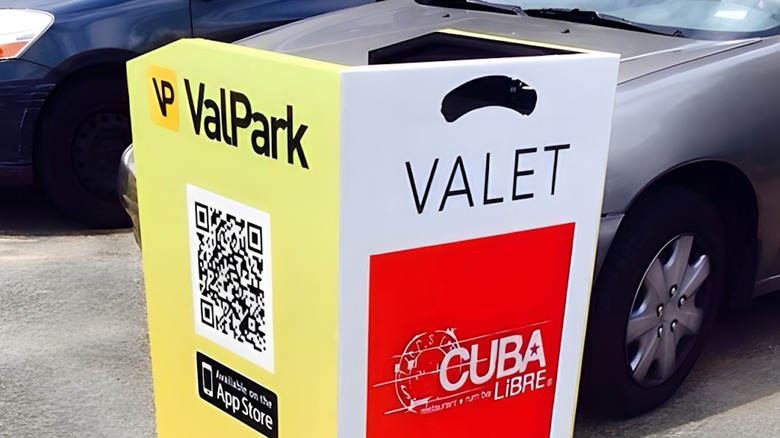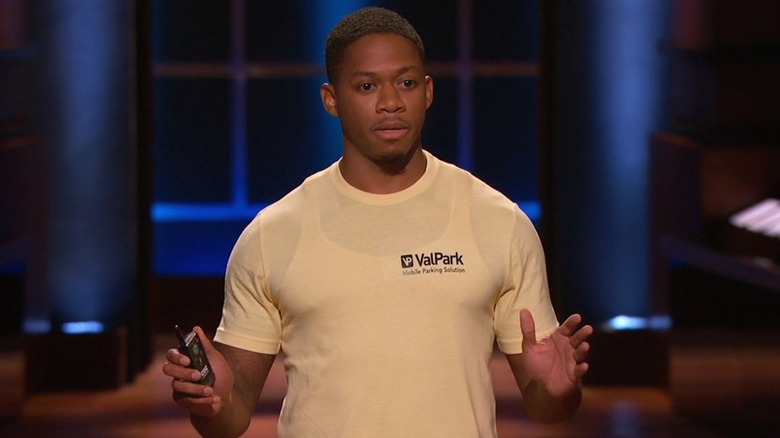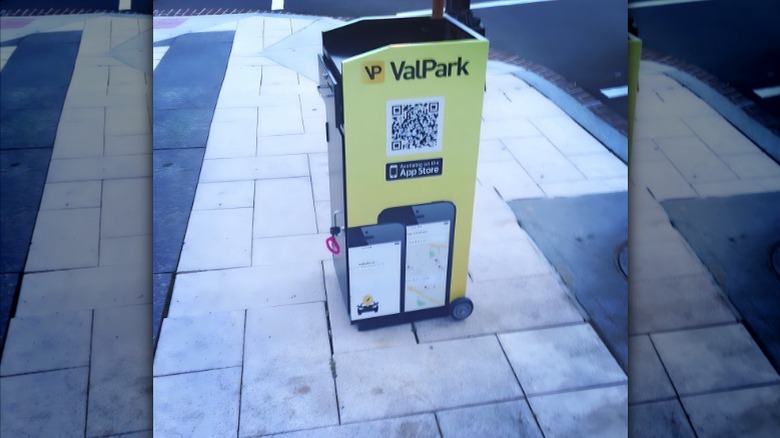What Really Came Of ValPark From Shark Tank?
Finding a parking spot is one of the real chores of driving, especially when you live in a big urban area. Spaces are at a premium, and you're often jostling with dozens, if not hundreds, of other drivers who are also looking for somewhere to dump their vehicle. It's an age-old problem, so it is no surprise that valet parking has a long history that predates the horseless carriage — all the way back to the days when people just rode horses.
The modern form of the service took shape when Herb Critin of Los Angeles started his own parking concession in 1946. Over the decades, he grew the company to the biggest in the valet parking business, raking in $30 million a year. Most commonly associated with high-end hotels and restaurants but now found anywhere from sports venues to shopping malls, the service provides a touch of luxury and convenience as you hand over your keys and let the valet worry about parking the car.
Web designer Wayne Johnson sought to revolutionize the system in Season 7, Episode 3 of "Shark Tank" with his ValPark app. His short pitch introduced a way to take cash and credit cards out of the equation, reducing the hassle of actually paying for valet parking. The nicely designed app also made retrieving a vehicle a simple touch of a button — but it was clear from the Sharks' stony faces that it would be a tough sell.
What happened to ValPark on Shark Tank?
Wayne Johnson entered the "Shark Tank" studio asking for $300,000 in return for 20% equity in ValPark. He had already invested $100,000 of his own cash and built the software from scratch. He had also secured a business partner who owned the largest valet parking service on the East Coast and had a 46% stake in the company. In the first year of business, ValPark made $270,000 in sales, and as of the 2015 episode it had 115 locations in Washington D.C., Maryland, and Virginia area.
The main concern for the sharks was how big the service could get. Mark Cuban, with his background in software, didn't believe there was enough money in it. Kevin O'Leary, who also made his fortune in software, felt that ValPark would need to corner the largest existing valet service in each city to become a success. Music industry legend Troy Carter felt that Johnson was underestimating his competitors and was the first to drop out, followed quickly by Cuban. O'Leary couldn't see Johnson's vision for "world domination" and stepped back, and "Queen of QVC" Lori Greiner didn't think it was worth her time for anything less than 30%, which she didn't want to take away from Johnson.
That just left Daymond John, who has experience in luxury services through his investment in Xedo, a tuxedo rental company. He considered making an offer but wanted to partner up with Cuban or Carter. They still weren't interested, and Johnson walked away without a deal.
After Shark Tank
After leaving the "Shark Tank" studio without an investment, Wayne Johnson stated he was determined to push ahead and make ValPark a success regardless. Mark Cuban commented that he thought Johnson would turn it into a decent business and make money, but it just wouldn't be enough to satisfy a big investor.
Their confidence was sadly misplaced. Johnson's appearance on the show brought some media coverage, most notably from a Forbes article entitled "Shark Tank: They May Regret Passing On The Uber For Parking." They were wrong, too, and that article is no longer live. Johnson's LinkedIn profile lists his involvement as co-Founder and CEO of Valpark as ending in May 2015, before the episode even aired in October. The company's last social media post on Instagram was in June 2016, and the company folded in the same year.
After the failure of ValPark, Johnson stayed in the hospitality sector and teamed up with fellow entrepreneur Tony Perry to form WT Nightlife, opening two high-end Washington D.C. clubs called Saint Yves and Abigail. They later turned their attention to food, joining forces with rapper Pusha-T to create Kitsuen, a hip ramen restaurant that shuttered its doors during the pandemic and appears to have gone out of business. Their latest venture is the upcoming Llamabar, a stylish juice cafe geared toward remote working.


